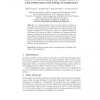Free Online Productivity Tools
i2Speak
i2Symbol
i2OCR
iTex2Img
iWeb2Print
iWeb2Shot
i2Type
iPdf2Split
iPdf2Merge
i2Bopomofo
i2Arabic
i2Style
i2Image
i2PDF
iLatex2Rtf
Sci2ools
122
click to vote
HAPTICS
2008
IEEE
2008
IEEE
Effects of Varied Human Movement Control on Task Performance and Feeling of Telepresence
In a telemanipulation system a human operator controls a remotely located teleoperator by a human system interface. In this work the effects of varied human movement control on task performance and feeling of telepresence by using such systems are analyzed. While it is well known that humans are able to coordinate and integrate multiple degrees of freedom the focus of this work is on how humans utilize rotational degrees of freedom provided by a human system interface. For the analysis a telemanipulation experiment with varying freed degrees of freedom has been conducted. The results indicate that rotational movements are performed intuitively by the human operator without considering the efficiency of task performance.
Related Content
| Added | 08 Dec 2010 |
| Updated | 08 Dec 2010 |
| Type | Conference |
| Year | 2008 |
| Where | HAPTICS |
| Authors | Helena Pongrac, Angelika Peer, Berthold Färber, Martin Buss |
Comments (0)

